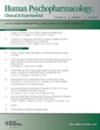Antipsychotic-Treated Schizophrenia Patients Develop Inflammatory and Oxidative Responses Independently From Obesity: However, Metabolic Disturbances Arise From Schizophrenia-Related Obesity
Abstract
Objective
To define the impact of obesity on inflammatory and oxidative disturbances in antipsychotic-treated schizophrenia patients.
Methods
Several cytokines, inflammatory, metabolic, and oxidative status markers were evaluated in obese (n = 40) and non-obese (n = 40) antipsychotic-treated patients and compared with age-and BMI-matched controls (n = 80).
Results
Schizophrenia patients had higher leptin, TNF-α, adiponectin, visfatin, resistin, P-selectin, NPY, BDNF, CD40-L, MCP-1, and malondialdehyde, and lower IL-6, ghrelin, neopterin, and vitamin E levels compared to their respective controls (p < 0.001). Total oxidant status was higher in non-obese patients compared to controls (p < 0.001), total antioxidant capacity was higher in obese compared to non-obese patients (p < 0.01), but vitamin A and paraoxonase levels were not different. High sensitive-CRP levels were higher in obsese controls relative to non-obese controls (p < 0.05) and in obese patients relative to non-obese patients (p < 0.001). Fasting glucose, insulin, HbA1c, HOMA-IR, uric acid, total cholesterol, and triglyceride concentrations were higher in obese patients compared to non-obese patients. Insulin concentrations and HOMA-IR were also higher in obese controls than in non-obese controls.
Conclusions
Our results suggest that inflammatory responses and oxidative stress develop independently from obesity in antipsychotic-treated schizophrenia patients. However, schizophrenia-induced obesity causes metabolic disturbances; thereby, obese schizophrenia patients are more liable to cardiovascular events and progress of metabolic syndrome than non-obese patients.

 求助内容:
求助内容: 应助结果提醒方式:
应助结果提醒方式:


